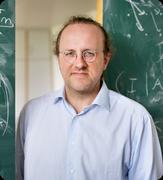Royal Society Milner Award 2014

Prof. Bernhard Schölkopf, Expert for Machine Learning Picture (cutout): Wolfram Scheible
The Royal Society (London, UK) just announced that Bernhard Schölkopf will receive the 2014 Milner award “for being a pioneer in machine learning whose work defined the field of 'kernel machines' which are widely used in all areas of science and industry.”
Bernhard Schölkopf is Director of the department „Empirical Inference“ at the Max Planck Institute for Intelligent Systems.
Machine learning attempts to extract regularities from observational data in order to generalize to new observations.
To do this, one needs to be able to compare past and future data. Schölkopf has shown how to elegantly do this using so-called kernel functions for a large family of geometric algorithms.
This leads to a successful class of learning algorithms that are used throughout science and engineering.
The Milner award is given annually for outstanding achievement in computer science by a European researcher, chosen by the Council of the Royal Society on the recommendation of the Milner Award Committee.
The Committee is made up of Fellows of the Royal Society, Members of the Académie des sciences (France) and Members of Leopoldina (Germany).
The winner of the award receives a medal and a personal prize of £5,000 and is invited to deliver a public lecture on his research at the Royal Society.
Contact: claudia.daefler@tuebingen.mpg.de
https://royalsociety.org/awards/medallists/2014/
http://tuebingen.mpg.de/en/homepage/detail/royal-society-milner-award-2014.html
http://www.is.tuebingen.mpg.de/#news
Media Contact
All latest news from the category: Awards Funding
Newest articles

Superradiant atoms could push the boundaries of how precisely time can be measured
Superradiant atoms can help us measure time more precisely than ever. In a new study, researchers from the University of Copenhagen present a new method for measuring the time interval,…

Ion thermoelectric conversion devices for near room temperature
The electrode sheet of the thermoelectric device consists of ionic hydrogel, which is sandwiched between the electrodes to form, and the Prussian blue on the electrode undergoes a redox reaction…

Zap Energy achieves 37-million-degree temperatures in a compact device
New publication reports record electron temperatures for a small-scale, sheared-flow-stabilized Z-pinch fusion device. In the nine decades since humans first produced fusion reactions, only a few fusion technologies have demonstrated…





















